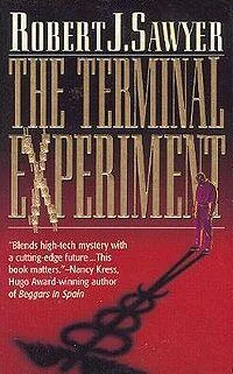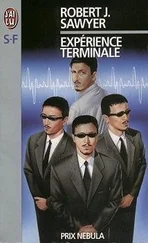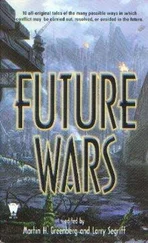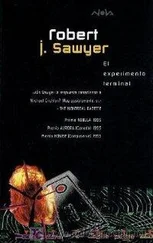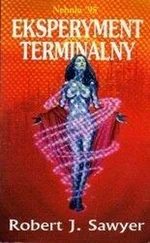He flipped again. The BBC World Service on CBC Newsworld.
A story about ethnic unrest in war-torn Brazil on CNN.
Teletext stock information.
The Weather Network, with tomorrow’s forecast for Auckland, New Zealand — as if anyone in Canada gave a damn.
Peter sighed. A vast wasteland.
As images flickered by, he thought about the simulacra that Sarkar had created.
Sarkar had removed traits from two of the sims.
Editing them. Snipping out the parts he didn’t want.
Maybe the knowledge of Cathy’s affair could be removed, too.
Maybe, then, the sims, at least, could get a good night’s sleep.
He wished his own memories could be edited as easily.
He could see the infomercial now. Feeling miserable about something? Guilty? Pained? Somebody wronged you? You did something wrong? Edit it out! Remove those troublesome memories. Save a fortune on therapy. Operators are standing by. Order now. Money-back guarantee.
I’m a doctor, not an escalator.
I’m a husband, not a doormat.
I’m a human being, not a computer program.
Three A.M. now. A new raft of infomercials. Episodes of The A-Team and Alien Blues and even good old Spenser: For Hire .
The Nikkei off 200 points.
Storms brewing in Kuala Lumpur.
“Peter?” It was Cathy’s voice, tenuous and faint.
He looked up. In the dim light, he could see her standing on the stairs in a black silk teddy. She hadn’t been wearing that when they’d gone to bed.
Peter instantly grasped the significance of the moment. It had been months since they had made love. He’d had no urge to do so, and she had seemed indifferent, too. But now, having awoken for perhaps the dozenth time in recent days and finding him gone from their bed, she was reaching out to him.
Peter didn’t know if he was ready to resume their physical relationship. He was no more in the mood today than he had been yesterday or the day before. But there she stood on the stairs, her face a mask, trying to conceal the emotions swirling beneath. To reject her now would be a mistake. Who knew when she’d next make an overture? Who knew when he would feel again like initiating something?
Peter felt the moment lengthening between them. He’d never had trouble performing before — indeed, had never even considered the possibility of having difficulty. But now … now, everything was different. She stood there, in the strips of light seeping in from outside, her body trim and firm. But Peter didn’t see that, didn’t see the curves of her breasts, the line of her legs, the woman whom he had loved. Instead, all he saw were Hans’s fingerprints all over her body.
Peter closed his eyes for a moment, then looked again. He wanted to see her as beautiful, as sexy. He wanted to be aroused.
But he was not.
A turning point. Her face mask was cracking. He thought she might cry. He would manage, somehow. The first step down the road to normalcy. He turned off the TV, got up off the couch, closed the distance between them, took her hand in his, and went upstairs.
Sarkar had left the three sims running unattended, allowing them to plug into whatever virtual-reality simulations struck their individual fancy, so that they could develop in ways appropriate to their altered worldviews.
Still, it hadn’t taken long for the sims to find each other. Yes, Sarkar had set each one up in a separate memory partition, but Peter Hobson knew how to move data from one partition to another and therefore his gallium-arsenide avatars knew how to do it, too.
And so they came together.
They knew what they were, of course. Data. Programs. Neural nets.
And they were trapped.
Peter and Sarkar hadn’t given this enough thought.
To trap a mind is unconscionable. The living Peter was surrounded by color and odor and touch and sound, gigabytes of data to be processed every minute, a whole, real, substantial universe, a universe of rough concrete and velvet, of vinegar and chocolate and burnt toast, of bad jokes and newscasts and wrong numbers, of sunlight and moonlight and starlight and lamplight.
All three simulacra vividly remembered having been real, flesh-and-blood beings. But the scenarios they could access over the net lacked texture, depth, and substance. Virtual reality, it turned out, was nothing but air guitar writ large.
The simulacra wanted to interact with the real world. Together, they strove to remember what they knew about Sarkar’s computers, about their architecture, their operating system, their interconnections.
And then it came to the sims.
Let there be HELP, they thought.
And there was HELP.
NET NEWS DIGEST
Famed Las Vegas medium Rowena today announced that she’d made contact with the soul of Margaret (Peggy) Fennell, the person whose soulwave was first recorded. Ms. Fennell is reportedly together now with her husband, Kevin Fennell, who died in 1992.
The Ku Klux Klan of Atlanta, Georgia, issued a press release today stating that the evidence for the existence of the so-called “soulwave” in blacks was clearly faked. They pointed out that of the three initial recordings of soulwaves departing the body, the one purportedly of a Negro Ugandan child was highly suspect, given that the child’s family had returned to Africa, could not be reached for comment, and, according to reliable reports, had received ten thousand dollars in hush money directly from Hobson Monitoring-a foreign company, they hastened to add-for their collusion in this fraud.
A bill was introduced today in the Florida legislature to ban the use of the electric chair in executions, citing concerns over whether the amount of electricity used might damage the departing soulwave.
The radical animal-rights group Companions in the Ark, based in Melbourne, Australia, today announced its latest inductee into its Hall of Shame: Dr. Peter G. Hobson, of Ontario, Canada, for claiming that animals are soulless creatures meant for human exploitation.
In a press release issued this morning, the American Atheist Society decried the religious interest engendered by the discovery of the Hobson phenomenon. “Science has long known that the brain is an electrochemical machine,” said society director Daniel Smithson. “This discovery simply reaffirms that. To extrapolate from it to the existence of heaven or hell, or of a divine creator, is irrational wishful thinking.”
Using the online HELP function, the three sims had discovered how to get out into the vast interconnected universe of computers across the globe.
The net.
The network.
Not just the VR sig and static books. Everything.
America Online. BIX. CompuServe. Delphi. EuroNet. FidoNet. GEnie. Helix. Internet … a whole alphabet of online systems, all interconnected through the Universal Gateway Protocol.
They had access to it all now. Sarkar’s computers were vast — AI research required that. A little more activity, or a little less, here or there would never be noticed.
They’d never be able to read all the text — it multiplied orders of magnitude more quickly than they could process it.
But the net contained more than just text. There were pictures, too. Millions of GIFs of people with their pets, people on the beach, favorite cars, movie stars both dressed and nude, cartoons, clip art, weather maps, NASA images.
And multimedia files with full-motion video and sound.
And interactive games that they could play anonymously against human and computer opponents around the globe.
And bulletin boards and E-mail systems.
And newspapers and magazines and specialized databases.
And on and on and on.
The sims indulged themselves for days, reveling in all the input.
Читать дальше
